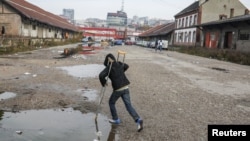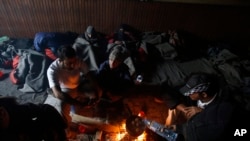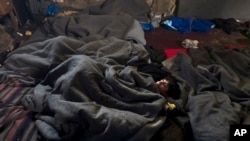Wrapped up in grey blankets, migrant boys, some as young as 10, warm themselves by a fire in a large, abandoned warehouse near the main railway station in Serbia's capital Belgrade.
Hungry, destitute and cold, they are often visited by Serbian men who offer to pay them for sex - knowing some are so desperate that they will do anything to survive.
"They come here and target the foolish ones," said Navid, a 16-year-old from Afghanistan, who did not wish to use his real name like other child migrants interviewed by the Thomson Reuters Foundation.
"They ask how much money you need. They pay and they go, but they do bad things with them," he said, explaining how some men offer up to 2,000 euros ($2,114) to have sex with the boys.
However, Navid's Afghan friend, Ali, said he did not blame those boys who sell their bodies in order to get by.
"They sleep hungry for nights here. It is cold, they have nothing, no money and they feel they have to do it," the 16-year-old said through a translator.
Hundreds of child migrants have arrived in Serbia since last year, travelling for months to escape fighting and poverty in Afghanistan, Pakistan, Iraq and Syria.
Like Ali, many are stuck in Serbia unable to continue their journeys to Western Europe because of snow and closed borders, having spent most of their money on smugglers who got them this far.
The United Nations children's agency UNICEF has said children who rely on human smugglers to move through Europe, often under a "pay as you go system," are prone to exploitation and violence, including prostitution and rape.
Around 7,700 migrants live in Serbia, the U.N.'s refugee agency says, with around 1,100 people, mainly Afghans, sheltering in abandoned warehouses in Belgrade.
Save the Children estimates that 10 percent of migrants in Serbia are unaccompanied minors. The charity said it had not heard reports of lone child migrants selling sex in the country.
"When they become stuck in Serbia, or any other country, due to the closed borders, they spend all the money they have, and they need money to continue the journey with smugglers," said Tatjana Ristic, Save the Children spokeswoman in Belgrade.
"It is very often difficult to reach and protect them," she told the Thomson Reuters Foundation.
Beaten and kicked
Serbia, which is not part of the European Union, was a focal point for migrants last year, when hundreds of thousands of migrants travelled through the Balkans to reach Western Europe.
Although that route was closed off last March, Serbian authorities estimate a further 110,000 migrants have passed through the country, many using smugglers to cross Serbia and its barbed-wire border with Hungary.
Ali said his journey had so far cost him 9,500 euros ($10,040) and that he was beaten by smugglers in Bulgaria, forced to eat leaves and drank dirty water to survive.
"I was about to faint because of thirst. But if I didn't keep walking, the smuggler would kick me and punch me," he said.
The eldest son in his family, Navid said he fled to Europe for a better life after suicide bombings devastated his hometown in northeast Afghanistan.
"My mother said, 'If you work in the city, there is fighting. If you go to school, they plant bombs and kill people.' We decided that I should leave," he said in the small room he shares with a 12-year-old boy at the Belgrade warehouse.
His bed, a dirty rug on a concrete floor, is in stark contrast to the heated, government-run refugee centers where some 6,600 migrants live, mostly women and children.
The two teenage boys said the warehouse was their only choice and they feared deportation if they looked for shelter at state-run migrant centers.
However, Dragan Velimirovic, who runs Serbia's largest refugee center near Adaševci village, about 113 kilometers (70 miles) west of Belgrade, said such fears were unfounded.
Some migrants prefer to sleep rough so they are able to contact smugglers more easily, he said.
"Authorities wouldn't send them back. If authorities wanted to do that, they could do it in 24 hours but they don't want to do that," he told the Thomson Reuters Foundation.
Stretched resources
But with the borders closed and around 100 migrants arriving each day, Serbian centers are reaching breaking point, says aid agency CARE International.
"The number doesn't seem big, but it's big for a country like Serbia which is a middle-income country with high unemployment," said Sumka Bucan, director of the group's humanitarian operations in the Balkans.
"It's very difficult to deal with this situation without assistance from the international community," she said.
Bucan said the poor living conditions outside of official camps as well as deportation fears are pushing many desperate migrants into the hands of smugglers and human traffickers.
"It's a very lucrative business and they are exploiting people, but it seems like it's the only option for the migrants," she said.
Despite a traumatic journey that has left him afraid for his life, Ali said he intended to use a smuggler to get him to Calais in France and onto Britain.
"I want to build my life there, and continue my education,” he said. "I hope that I will arrive to my destination safely, God willing.







